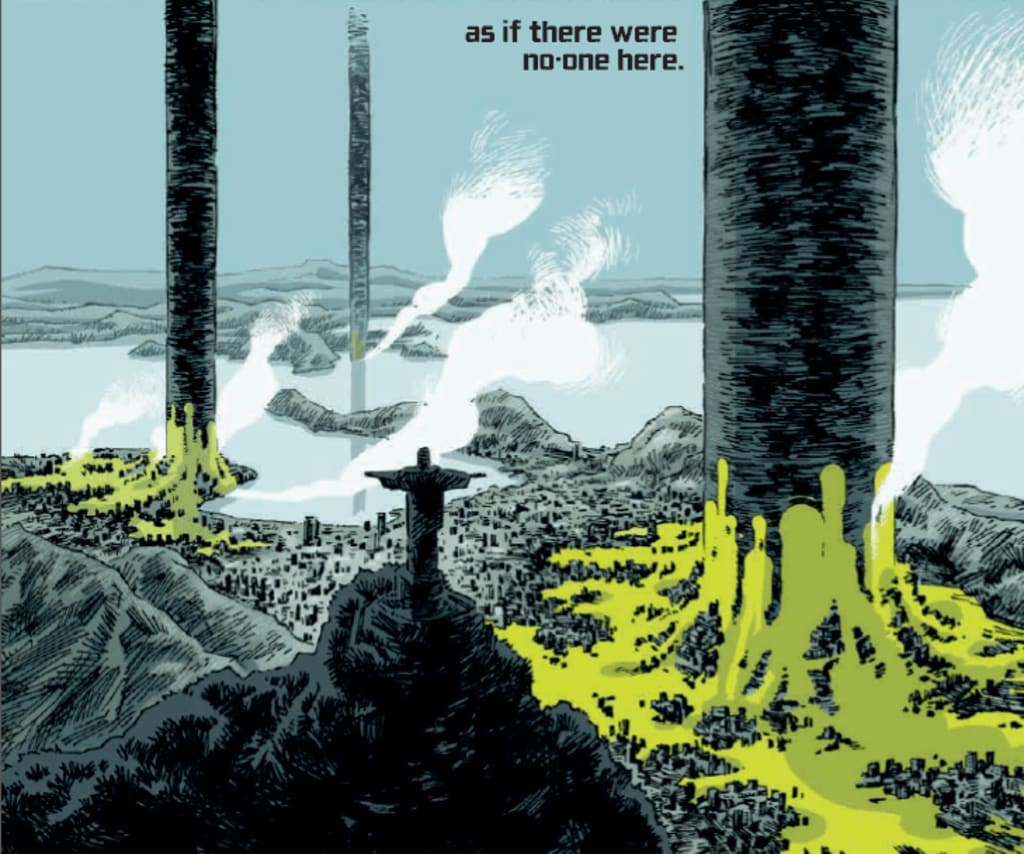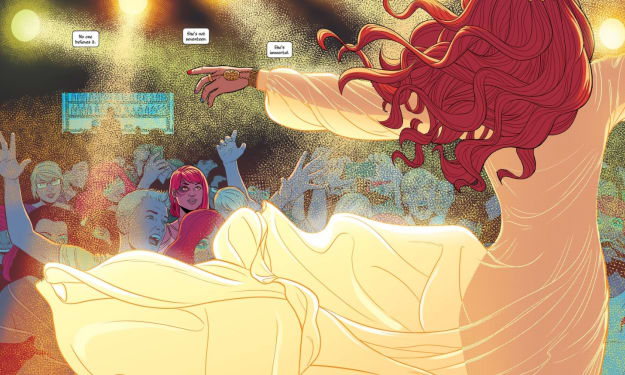'Trees: Volume 1' Review by Warren Ellis and Jason Howard
John Wyndham for the 21st Century

Warren Ellis’ Trees is a fascinating, sprawling series that operates on a global scale. Like his Freak Angels series from Avatar, he’s openly channelling British Science Fiction author, John Wyndham, from the very outset of this book. Taking the premise of an alien invasion, Trees chronicles life ten years after a number of alien, black columns arrive on Earth, and do... nothing. They loom over human cities, silent and apparently inactive, apart from the occasional discharge that leaks into the planet’s biosphere. As a consequence, the story Ellis is crafting is both the story of human reaction to these aliens and of what happens as the Trees begin to change. I must say that my initial feeling with regards to the structure of this comics series is that it is a novel, one that builds slowly and inexorably towards a point where there will be convergence.
The story focuses on a number of characters, spread out from New York City to Sicily, Somalia, China, and the Arctic Circle. Most of these figures never meet, but there is a sense their paths will cross later on. Each character handles a slightly different aspect of human life, so the Arctic Circle section of the story is science-based and drives the development of the story, while much of the others locales deal with different aspects of human politics. Politics is actually a major driver of the story, as it focuses on the idea of how humans react and ranges from issues of borders, artistic expression, crime, and the growth of Fascist politics (just in case you worried that this was purely unconnected to the real world) and, oddly, Aleister Crowley’s Abbey of Thelema.
The characters range from a Chinese artist moving into a city under the Chinese tree where art and science are being pushed to exciting, new levels, a woman who enters the world of espionage and crime in Sicily, the President of Somalia, a French journalist, and a number of others. Most of their stories are growing and unresolved by the end of Volume One. They are almost all, to a man, written in that classic Warren Ellis style of sarcasm, snarking, and tension. Despite this, Ellis remains remarkably skilled at making the reader care about characters who are, essentially, quite unpleasant. This skill leads to a strange mixture of moments that are laugh-out-loud funny, tense and, sometimes, surprisingly touching. He is adroit at capturing the softer side of human emotion in unexpected ways, which usually adds unexpected moments of depth to his work.
There is a theme of new arrivals throughout the first volume. The characters literally arrive at these places at the beginning of their personal arcs. It isn’t the only theme, however, as change is also an important subject throughout this book. This drives the Science Fiction angle in the form of one of the Trees suddenly altering its behaviour in a way that creates a disaster, which dominates the Arctic Circle parts of the book. This part of the story focuses strongly on a scientist, Dr. Joanne Creasy, who I suspect will be the main protagonist as the series evolves as she works out how to solve the situation (this being said, I could be very, very wrong). What’s interesting is that this change in the aliens’ behaviour comes in an innocuous form, with the Trees producing black poppies.
At the same time, we start to see a new phase of human reaction beginning in many forms across the world, triggering violence, and a couple of parts of the story tip into warfare and atrocity. This takes the form of war between Somalia and Puntland, while the People’s Republic of China moves in on its rogue city and destroys it, killing nearly everybody there. Again, the call-back to parts of Wyndham’s oeuvre feels very strong here, reminding me of the Russian response to their own village of Midwich Cuckoos (surrounding the place and firing inwards to kill everyone).
The art is rather muted, focused on "real life" so to speak, rather than on being bright and exciting. It’s rather beguiling in many ways, drawing attention to small details and making the feeling of a world gone wrong deeply embedded into the book. Howard is skilled at making every vista look interesting, but also downbeat, with an almost sinister edge.
This story is sprawling, and if you like narratives that don’t have that aspect, this might not be the book for you. There isn’t really space for Ellis to dive deep into his characters, and—spoilers—a lot of them, especially the male characters, die during this book to pave the way for protégés and friends to carry on the story. Given, the tone is very British and, like the art, downbeat.
I would recommend this book to serious SF fans, fans of apocalypse fiction, and also people who like that British voice in their SF. If you enjoyed Trees, I would suggest checking Ellis’ Injection, as well.
About the Creator
Steve Cotterill
Hi,
I'm a writer, nerd and roleplayer (the tabletop kind). I love comics, horror, Goth music, and kink.






Comments
There are no comments for this story
Be the first to respond and start the conversation.